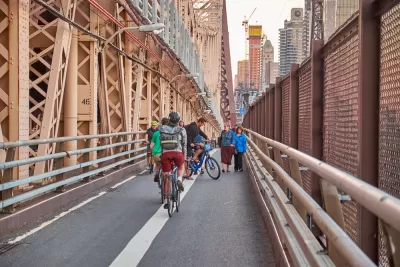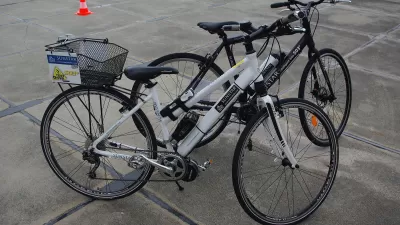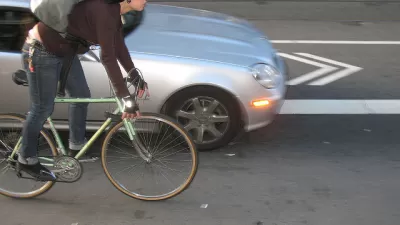Advocates say the mandatory bike helmet proposal is a step in the wrong direction for traffic safety.

Gothamist reports on a bill that would require all New York cyclists to wear helmets while riding, punishable by a $50 ticket. Currently, only riders under the age of 14 must wear a helmet.
The bill relies on data, since federally renounced, suggesting that helmets significantly reduce head injuries. But bike advocates say that mandatory helmet laws can make cycling more dangerous by discouraging cycling and weakening the "safety in numbers" effect.
Rather than focus on the behavior of individual cyclists, an advocate told the site, safety campaigns like Vision Zero are "based on the idea that a system protects individuals, specifically that a system of well-designed streets protects individuals."
Studies suggest that drivers behave differently when pedestrians and cyclists are nearby—the more, the better. The best way to achieve that, advocates say, is to facilitate walking and biking by investing in infrastructure. Helmet penalties could instead discourage ridership, as it was found to do in Australia, Gothamist notes.
FULL STORY: Albany's Mandatory Helmet Law Would Make Bicycling Less Safe, Advocates Warn

Planetizen Federal Action Tracker
A weekly monitor of how Trump’s orders and actions are impacting planners and planning in America.

Maui's Vacation Rental Debate Turns Ugly
Verbal attacks, misinformation campaigns and fistfights plague a high-stakes debate to convert thousands of vacation rentals into long-term housing.

Restaurant Patios Were a Pandemic Win — Why Were They so Hard to Keep?
Social distancing requirements and changes in travel patterns prompted cities to pilot new uses for street and sidewalk space. Then it got complicated.

In California Battle of Housing vs. Environment, Housing Just Won
A new state law significantly limits the power of CEQA, an environmental review law that served as a powerful tool for blocking new development.

Boulder Eliminates Parking Minimums Citywide
Officials estimate the cost of building a single underground parking space at up to $100,000.

Orange County, Florida Adopts Largest US “Sprawl Repair” Code
The ‘Orange Code’ seeks to rectify decades of sprawl-inducing, car-oriented development.
Urban Design for Planners 1: Software Tools
This six-course series explores essential urban design concepts using open source software and equips planners with the tools they need to participate fully in the urban design process.
Planning for Universal Design
Learn the tools for implementing Universal Design in planning regulations.
Heyer Gruel & Associates PA
JM Goldson LLC
Custer County Colorado
City of Camden Redevelopment Agency
City of Astoria
Transportation Research & Education Center (TREC) at Portland State University
Jefferson Parish Government
Camden Redevelopment Agency
City of Claremont





























